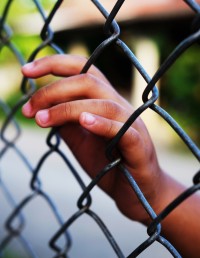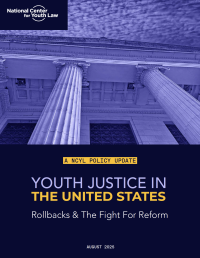NCYL Lawsuit Reforms Texas Juvenile Institutions, Where Youth Were “Tortured and Terrorized”
In January 1971, the Texas Youth Council blocked NCYL and the El Paso Legal Assistance Society from conducting private interviews with incarcerated youth, despite a court order authorizing the interviews. The class action lawsuit that ensued, known as Morales v. Turman, Civ. A. No. 1948 (E.D. Tex. Feb. 12, 1971), lasted for over a decade and went all the way to the Supreme Court. Morales v. Turman led to sweeping reforms to end abusive and unconstitutional practices in Texas’s juvenile institutions and established benchmark standards for providing youth with medical and mental health care and education.
At the start of the lawsuit, the Texas Youth Council (“TYC”) had six “training schools” that housed up to 2,520 boys and 839 girls. Roughly 9% of the boys and 4% of the girls in the training schools were committed for violent crimes. As TYC later admitted, numerous youth had received no hearing in Juvenile Court and/or no legal representation before being adjudicated delinquent and committed to custody.
After being denied private interviews with their clients, the plaintiffs’ attorneys went to court in February 1971 and quickly won a preliminary injunction. Judge William Wayne Justice of the U.S. District Court barred TYC from interfering with the plaintiffs’ rights to consult privately with their attorneys and forbade TYC from continuing its practice of opening, reading, copying, and delaying legal mail.
In December 1972, the plaintiffs—representing a class of all children who were presently, who had been in the past, or who would be in the future adjudicated delinquent and involuntarily committed to TYC’s custody—won a contentious discovery motion. The District Court allowed four of the plaintiffs’ experts to conduct “participation observation” studies, in which the experts would live in two of the TYC institutions for up to 30 consecutive days. The plaintiffs later presented testimony from these experts during a six-week trial. The court found their testimony to be of “invaluable assistance.”
The evidence at trial revealed horrific abuse in TYC institutions. As the District Court would later conclude, TYC had a “widespread practice of beating, slapping, kicking, and otherwise physically abusing juvenile inmates, in the absence of any exigent circumstances . . . .” TYC officials engaged in what was called “racking,” where boys were “forced to line up against the wall with their hands in their pockets while the correctional officer punched each one in the stomach.” Tear gas was used as punishment, even where “no riot or other disturbance was imminent[,]” such as when one youth “was tear-gassed while locked in his cell for failure to work” and another “was gassed for fleeing from a beating he was receiving[.]” TYC sent youth to solitary confinement for up to a month or more, including for conduct that was relatively minor or nonviolent. These abusive conditions prompted the District Court to excoriate the defendants, stating that they had “unregenerately and callously endeavored to preserve and perpetuate debased, execrable institutions in which juveniles were tortured and terrorized.”
One expert witness described Mountain View State School for Boys, TYC’s maximum security facility, as an “evil place.” There was no objective criteria to determine when a boy would be sent to Mountain View; instead, it was a matter of staff discretion. As a result, some boys were there whose underlying delinquency charges were for “status offenses” such as truancy or running away from home. The average stay at Mountain View was 1.5 years.
On August 31, 1973, the District Court issued an emergency interim order and entered a preliminary injunction regarding certain of the abuse allegations and the plaintiffs’ claims regarding their right to medical and psychiatric treatment. The court found numerous violations of the Eight Amendment’s ban on cruel and unusual punishment. The District Court also appointed an ombudsman to field complaints regarding abuse at Mountain View.
On August 30, 1974, the District Court entered another order, keeping the emergency interim order of August 1973 in place and making findings of fact based on the evidence presented at trial. The Fifth Circuit Court of Appeals later reversed the District Court’s order, based on a finding that the case should have been heard by a three-judge panel of the District Court. The plaintiffs appealed to the United States Supreme Court and won. In an opinion dated March 21, 1977, the Supreme Court found that the District Court had properly exercised jurisdiction over the case and that a three-judge panel was not required. The Fifth Circuit then sent the case back to the District Court for further evidentiary hearings.
Several years of discovery ensued, and the parties eventually began settlement talks. The District Court approved the comprehensive settlement agreement the parties negotiated and entered final judgment in the case on April 16, 1984. The settlement agreement called for a “Morales Consultant Committee” to oversee implementation of the reforms. Monitoring under the settlement lasted until 1988.
Morales v. Turner led to reforms throughout Texas and across the nation. As of 1975, 100% of TYC youth were sent to the training schools. By 1986, due to the lawsuit’s focus on community-based care, TYC was placing nearly 40% of its youth in alternative, community settings. The lawsuit led to the closure of several TYC schools and the transfer of Mountain View. During the pendency of the case, the Texas legislature also passed a bill incorporating due process rights for youth in delinquency into the Texas Family Code. Morales v. Turman is credited with having “helped establish the first national standards for juvenile justice and corrections” and with causing the TYC to abolish corporal punishment. A model for similar lawsuits in a dozen other states—including Oregon, Oklahoma, and Idaho—Morales v. Turner is remembered today as “result[ing] in sweeping reforms to the commitment of juveniles, both in Texas and nationally.”
NCYL (initially under the name Youth Law Center) represented the plaintiffs along with co-counsel from El Paso Legal Assistance Society and Austin Legal Services. The U.S. Department of Justice acted as amicus curiae throughout much of the case, and the Mental Health Law Project represented amici curiae the American Orthopsychiatric Association, the American Psychological Association, the American Association on Mental Deficiency, the Child Welfare League of America, and the National Council on Crime and Delinquency.





